The Secret Cardinal Read online
Page 4
Three Alfa sedans raced into the piazzale. Hwong’s heart pounded at the sight of the fast-approaching cars, her body instinctively pumping adrenaline in preparation to fight or flee. The water bottle slipped from her trembling fingers.
“Lord, help me,” Hwong stammered.
“What?” Kilkenny asked, lost in his thoughts.
“I have something for the pope,” Hwong replied, touching the iPod on her arm. “Evidence of a great tragedy. My government does not want the world to know what they’ve done.”
Tires squealed against the pavement. The lead car veered left to cover the front of the monument. The second car stopped at the guardrail directly in front of Kilkenny and Hwong, and the third moved to box them in on the right. Two men from the first car, both wearing black balaclavas, leaped over the guardrail as the doors of the second car flew open.
“Run,” Kilkenny said, pushing Hwong away from the four men rushing toward them. “Head for the woods.”
A bullet ricocheted off granite as they rounded the back of the monument, and several tourists screamed. The third car stopped directly in their path and two more men emerged, charging with pistols drawn. In a quick calculus of their situation, Kilkenny knew they were outnumbered, outgunned, and caught almost completely in the open. Though it had been a few years since his Navy days, Kilkenny’s SEAL training kicked in.
Using his only weapon, Kilkenny hurled his water bottle at the nearest assailant. It struck the man squarely in the face as Kilkenny quickly closed the distance. Moving to the outside, he grabbed the man’s right wrist and twisted until the elbow locked. A sharp palm strike audibly fractured the joint, and the man’s weapon clattered to the pavement. Using the momentum of his attack, Kilkenny spun his opponent around by his broken arm and hammered him into the second assailant.
Both men fell in a heap, the one on the bottom knocked senseless when he toppled back and struck his head against the cobblestones. Hwong ran straight for the walking paths that led into the woods, and as Kilkenny turned to follow her, he scooped up the loose pistol and emptied the weapon at the next pair of pursuers. His shots chiseled the corner of the monument’s plinth, buying time by forcing the men to seek cover behind the sculpted mass of stone.
As he emerged from the long shadow cast by Garibaldi’s monument, Kilkenny saw the pair of assailants from the first car chasing Hwong. One of them was shouting at her angrily in Chinese and, failing to close the distance on her, took careful aim and fired. A single round caught Hwong between the shoulder blades. Her arms flailed as if to grasp something. As Hwong’s legs folded beneath her, she fell to the ground like a wounded bird.
Kilkenny charged angrily toward the shooter, colliding with the man in a vicious broadside and knocking him down. The impact sent the still-smoking pistol clattering across the pavement, and the weapon came to rest near a group of frightened tourists. Kilkenny leaned over and stripped the balaclava from the man’s head.
Recovering from the open-field tackle, Liu faced Kilkenny, his eyes a pair of smoldering black coals. He struck quickly, spearing Kilkenny in the chest with the tip of his elbow. The air burst from Kilkenny’s lungs, and as he gasped, Liu smashed the back of his fist against Kilkenny’s forehead and raked his knuckles down Kilkenny’s face. Liu grabbed a fistful of Kilkenny’s hair and rolled. As Kilkenny toppled over, Liu struck the side of his neck with the outer edge of his right hand, stunning Kilkenny to near-unconsciousness.
Liu pushed Kilkenny aside and leaped to his feet. In the distance, he heard the wail of approaching sirens.
“I have them,” one of the Italians teamed with Liu called out, Hwong’s iPod and phone clutched in his meaty fists.
Not waiting for the order, the others loaded the two wounded men into the nearest car. Liu considered finishing off Kilkenny, but he had what he came for and the police were on their way.
As the Alfas fled the terrace, Kilkenny struggled to his feet and staggered to where Hwong had fallen supine on the pavement. From the tiny wound, an oozing slick of blood now soaked her T-shirt. She was still alive, though her breathing was quick and shallow. Kilkenny took her hand but dared not move her.
“Hang on,” Kilkenny urged.
“Did they take it?” Hwong asked, pointing weakly at her arm. The armband with her iPod was gone.
“Yes.”
Her look of relief surprised Kilkenny.
“Long live Christ the King,” she said softly. “Long live the pope.”
3
VATICAN CITY
Clad in one of his new suits, Kilkenny walked out of the eastern pavilion of the Casina—the sixteenth-century summer residence of Pope Pius IV—and descended a few steps into an oval court paved in a geometric pattern of light and dark marble. A low wall framed the perimeter of the ellipse, a boundary broken at the far ends by a pair of arched gateways and along the short axis by porticos fronting the Casina’s two pavilions. The artisans who built the courtyard had envisioned it as an ancient nyphaeum, decorating the idyllic space with a High Renaissance flurry of statues and reliefs, stucco-framed depictions of riders atop water-spewing dolphins.
The Vatican gardens in their autumn splendor surrounded the Casina, and beyond the archway to Kilkenny’s left, the white marble dome of Saint Peter’s Basilica glistened in the late-day sun. Cardinal Donoher ambled through the southern archway with a warm smile on his ruddy face. He wore the traditional black cassock and mozetta trimmed with scarlet piping and buttons, a broad scarlet sash around his ample waist, and a matching zucchetto atop his thinning head of gray hair. Donoher had received the zucchetto from the current pope when he was made a cardinal, and the scarlet details in his attire were a sign of his position as a prince of the Church. Suspended from a gold chain around his neck was the pectoral cross that Kilkenny’s father gave him at his consecration as a bishop. The gilded cross bore the embossed image of the risen Christ vested as a priest.
Donoher’s face turned solemn when he saw the bruises on Kilkenny’s face. “I see you had yourself quite a morning.”
“I’ll live.”
“Sadly, the police tell me the same cannot be said of the young woman.”
Kilkenny nodded grimly.
“The police have nothing as yet on your attackers, but I feel certain the truth of the matter will be revealed in time.” Donoher glanced at his watch. “We’d best be moving along.”
Kilkenny followed Donoher’s lead toward the archway facing the basilica and noticed a slight hitch in the cardinal’s stride.
“Are your knees bothering you?”
Donoher nodded. “My physician thinks I should replace both of these creaky old joints. He tells me there’s not much cartilage left between the bones, but I’ve been putting it off. It’s the price for all the fun I had playing football—of course, it’s your father’s fault.”
“How so?”
“When my family emigrated from Ireland, he was my first friend when we arrived in Detroit’s Corktown—and he’s responsible for introducing me to American football. Had he not dared me to try out with him for the team at Catholic Central, I might still be able to dance a jig.”
“But Dad’s knees are fine,” Kilkenny offered.
“He wasn’t a lineman, and he didn’t play in college. Four years I started for Notre Dame, and I feel it every time the weather changes.”
“That’s why I run and swim.”
As he walked with Donoher through the gardens, Kilkenny’s eyes wandered across brilliant floral displays, teasing out the details of a landscape design that had carefully evolved over the centuries. Deftly orchestrated views opened at precisely the moment that maximized their effect. The organic and the man-made blended harmoniously as a reminder that creation has both a physical and spiritual nature.
“Do you think anyone could ever get jaded working in a place like this?” Kilkenny asked.
Donoher considered the question. “I can’t imagine. You were just a child when I first came to work here, and still n
ot a day passes that I don’t discover something new. I believe it was Michelangelo who said ‘Trifles make perfection—and perfection is no trifle.’ An inquisitive mind never grows bored. And on the subject of inquisitive minds, how are you coming along on my little project?”
In trying to frame a response to Donoher’s question, Kilkenny found he was having some difficulty separating the man from his office.
“Fine,” Kilkenny replied, his answer straddling the line between honest and polite.
“Your enthusiasm is underwhelming.”
“Don’t get me wrong—”
“But . . .” Donoher interjected.
“But you have a lot of very bright people working here, and I don’t really see why you need my help. To be honest, this job feels like an excuse to get me out of Ann Arbor.”
As he spoke, Kilkenny studied the cardinal’s face, expecting to find disappointment. Instead the older man shook his head and smiled.
“Figured it out, did you?”
Kilkenny nodded.
“In a sense, you’re right,” Donoher admitted. “Why I brought you here has nothing to do with shelving my books. And don’t tell your father, but it has nothing to do with your grief either. To be honest, I need your help with something that is terribly important, and frankly, any personal benefit you may derive from being here is simply a bonus.”
“I didn’t derive much of a bonus today.”
“That much is evident, but you can bear those wounds as proudly as those you carry in your heart. That you would risk your life for a stranger says as much about your character as the relationship you shared with Kelsey.”
“Both women died.”
“But they were not alone in their last moments of life—you were with them. As brief as your marriage was, I thank God for the fourteen months the two of you shared as husband and wife.”
“Eight months,” Kilkenny corrected. “We were married in January.”
“You and Kelsey renewed your vows in January, but you were married the previous June. I know, because I gave your priest permission to bless your union. I must admit that your sudden elopement came to me as something of a surprise.”
“Kelsey was dead-set against the idea until the Shenzhou-7 tragedy.”
Donoher nodded. The fiery deaths of three Chinese astronauts had been global news, ultimately involving Kilkenny himself.
“If the worst happened during her mission,” Kilkenny continued, “she wanted to die as my wife.”
“A brilliant physicist, a daring astronaut, a talented athlete and teacher, a cherished daughter and sibling, a beloved wife, and the bravest of mothers,” Donoher said, recalling his eulogy. “And a kind and gentle beauty to boot. That woman may have been better than you deserved.”
“I’m sure of it,” Kilkenny agreed.
Barely a month into her long stint in orbit, Kelsey had told him over a secure connection that she was unexpectedly expecting. Their joy was matched only by NASA’s perturbation over the logistical nightmare of a pregnant astronaut in orbit, but both were short-lived. Within a week of Kelsey’s announcement, her pregnancy ended in miscarriage. She completed her mission as planned and returned home, where she publicly married Kilkenny, and the two resumed their efforts to start a family. Her second pregnancy came as quickly as the first, but on its heels came the illness that would ultimately take both Kelsey and her child. She and Kilkenny had known each other since childhood and been friends long before falling in love. Kilkenny couldn’t remember a time when Kelsey hadn’t been a part of his life, and every day he found it a struggle to go on without her.
“So,” Kilkenny said, breaking the silence. “What do you need my help with?”
4
Donoher led Kilkenny through a side entry near the Sistine Chapel. After clearing a plainclothes detail of Swiss Guard security, they ascended to the top floor of the Apostolic Palace. As they reached the papal apartments, a tall, thin man moved to meet them. The attire of the pope’s private secretary was similar to Donoher’s except the details were amaranth red.
“Your Eminence,” Archbishop Sikora said respectfully.
“Archbishop, so good to see you again,” Donoher replied. “Accompanying me today is Mister Kilkenny.”
“Your Excellency,” Kilkenny offered.
“And is His Holiness feeling well today?” Donoher asked.
“A little better. He is waiting for you both in the Redemptoris Mater Chapel. This way, please.”
The archbishop led them through the second Bramante loggia and into the papal chapel dedicated to the Mother of the Redeemer. Built in the sixteenth century for Pope Gregory XIII as the Matilda Chapel, the room underwent extensive renovation during the late nineteen-nineties.
Kilkenny was stunned as he stepped in from the formal Renaissance hallway into a space reminiscent of an Eastern Orthodox pilgrim church. Mosaics of startling beauty adorned the chapel walls, scenes from the New Testament rendered in the Byzantine iconographic tradition. A vision of New Jerusalem filled the wall behind the marble altar, and on the ceiling above were a white cross and the Pantocrator. Though only a few years old, the chapel possessed an aura of timelessness.
Amid the splendor of the chapel, Pope Leo XIV sat deep in prayer. The pope’s throne stood against the rear wall of the chapel, a permanent fixture along with a lectern and the altar. Sikora motioned for them to remain by the door as he approached the pontiff. He knelt at the foot of the papal throne, leaned his head close to the pope’s, and spoke softly. Kilkenny saw the pope nod, and the archbishop signaled for them to approach.
Elected when Kilkenny was a child, the man seated before him was the only living pope he could remember. Age and infirmity had eroded the church leader’s youthful vigor during his long reign. Shoulders slumped, the supreme pontiff’s body seemed to be slowly drawing into itself during his waning years, as if trying to return to the same dimensions it possessed at his birth. The pope looked up and extended a quivering hand to his visitors.
“Your Holiness,” Donoher said with deep reverence as he knelt and kissed the papal ring.
Kilkenny did the same, and the pope bade them to sit. As they moved a pair of chairs close to the papal throne, Sikora left the chapel, closing the doors behind him.
“We are sorry to disturb your meditations, Your Holiness,” Donoher began, but the pope dismissed the apology with a short wave of his hand.
“The matter you have come to discuss has been in my prayers for some time now. So, this is the young man that you spoke to me about?”
“It is,” Donoher replied.
As the pope studied him, Kilkenny was immediately struck by the intensity and clarity of his gaze. Wrapped within a withering husk of a body was a spirit and intellect that had lost none of its potency.
“Mister Kilkenny, this chapel was a gift to me from the cardinals, one that has brought me great peace. Do you know what it represents?”
“No, Your Holiness, I don’t.”
“The inspiration for this chapel was taken from a sermon given by a Jesuit priest named Tomas Spidlik,” the pope explained. “The central theme of this sermon was that the Church in the Third Millennium must breathe with two lungs, that of the East and of the West. This space breathes with two lungs and symbolizes unity within the Catholic Church.”
“It certainly is magnificent.”
The pope nodded. “I asked to meet with you here because there is something I wish you to see.”
The pope pointed to the mosaics on the wall behind him. The image spanning the wall immediately reawakened the dormant memories of Kilkenny’s high school theology classes. It depicted the Parousia—the Second Coming of Christ. And on the Earth were those who had been restored to life, the promise of the resurrection fulfilled.
“Do you see the man and the woman near the edges of the wall, leading the processions of the faithful?” the pope asked.
“Yes,” Kilkenny replied. “Who are they?”
“Mary, the
Mother of Jesus, to whom this chapel is dedicated, and Saint John the Baptist. Please, take a closer look at the people they are leading back to life.”
Kilkenny rose to study the processions, trying to determine who would have earned the privilege of being led into the kingdom of heaven by two of the people closest to Christ. Among those restored to life was a figure in gray stripes, a victim of Hitler’s concentration camps. Kilkenny then recalled that during World War II, the pope and his fellow seminarians hid Polish Jews from the Nazis as the horrors of Auschwitz were occurring just a few miles outside Krakow.
“These are martyrs,” Kilkenny said. “People who died for their faith.”
“Yes. Martyrs throughout the ages, including the victims of Nazism, Communism, and Islamic fanaticism. I wanted you to see them because martyrs are still being made today. Now please sit, so we can talk.”
Kilkenny returned to his seat beside the cardinal.
“Tell him about the fire,” the pope said to Donoher.
“I assume you have heard about the theater fire in Beijing back in August?”
Kilkenny nodded. “The place was a deathtrap; all the exits were blocked. It was a horrific accident.”
“It was not an accident,” Donoher declared. “And nearly every one of those who perished in those flames was a Roman Catholic.”
The pope bowed his head. “Over five hundred martyrs.”
“In the minds of those who rule the People’s Republic of China, Christianity and democracy represent the most significant threats to their privileged positions,” Donoher explained. “When the Communists seized control in 1949, they set out to eradicate all religion. Failing at that, they settled for rigid control of the manner of religious practice and the message the faithful would hear. Catholics in China could either worship in a church loyal only to the state or take their faith underground and risk persecution or worse. Efforts have been made over the past twenty years to improve relations between Beijing and the Holy See, but always to no avail. Roman Catholicism remains illegal in China, and not since the earliest days of the Church have we witnessed atrocities like those committed against our Chinese brethren.”

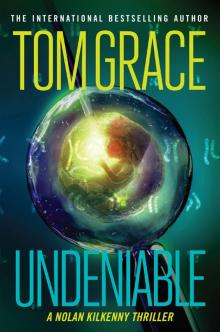 Undeniable
Undeniable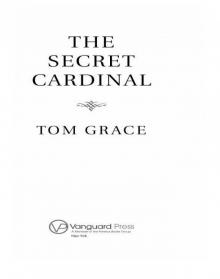 The Secret Cardinal
The Secret Cardinal Spyder Web
Spyder Web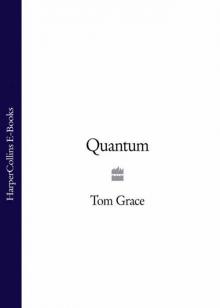 Quantum
Quantum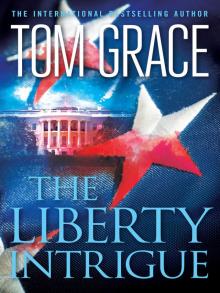 The Liberty Intrigue
The Liberty Intrigue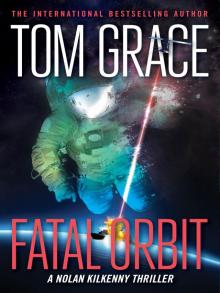 Fatal Orbit
Fatal Orbit